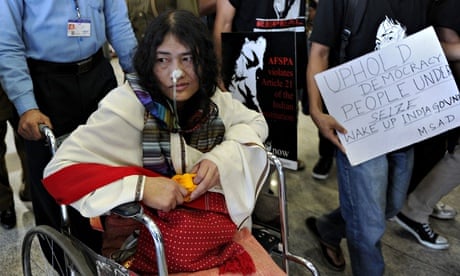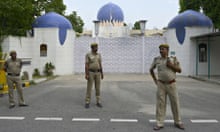An Indian judge has ordered the release of human rights campaigner Irom Sharmila Chanu, who has been on hunger strike for nearly 14 years in protest at a law granting sweeping powers to security forces in the country's troubled north-east.
Sharmila, 42, had appeared before a sessions court in the state capital Imphal to appeal against the decision of a lower court to put her on trial on a charge of attempted suicide. Under Indian law any attempt to take one's life is punishable by a year's imprisonment.
Popularly called the Iron Lady of Manipur, she began her hunger strike on 5 November 2000, three days after soldiers from the paramilitary Assam Rifles allegedly shot and killed 10 civilians.
She has become a figurehead for campaigners seeking repeal of the Armed Forces (Special Powers) Act (AFSPA), which was introduced in 1958 as a response to anti-government insurgencies in Indian-ruled Kashmir and also in parts of the country's remote north-east. The controversial law allows troops to make arrests without warrants and even shoot suspected rebels without fear of prosecution. It also gives police sweeping powers of search and seizure.
Since her last meal on 4 November 2000, Sharmila has been held in the security ward of Imphal hospital, where she is force-fed liquids through a pipe in her nose. She is kept in isolation and the authorities control her meetings with visitors. Once every year, the police go through the ritual of releasing her and then promptly re-arrest her on the same charge of attempted suicide.
But on Tuesday the Manipur sessions judge ruled that Sharmila had been wrongly charged with attempting to suicide, since her protest was "in support of a political demand through lawful means".
"We argued that a hunger strike is not illegal or unconstitutional," said Irom Sharmila's lawyer, Khaidem Mani. "Even the British had not treated Mahatma Gandhi as a criminal when he fasted for a just cause."
"The judge upheld our stand that Irom Sharmila cannot be accused of a crime when she is only demanding the repeal of a draconian law," he told the Guardian.
Human rights activist Babloo Loitangbam said the court had accepted that the charge of attempting suicide was not sustainable.
"Sharmila is not trying to take her life, she is trying to make a political point which is to repeal the Armed Forces (Special Powers) Act," he told the NDTV network.
Human rights campaigners say the armed forces use the law to detain, torture and kill rebel suspects, but oppose reform of the legislation, saying it needs extraordinary powers to deal with insurgents.
Though Sharmila had been told about the judge's order, Mani was unable to meet her, he said. He plans to visit the hospital on Wednesday.
"I am confident she will be released on Wednesday, though the authorities may try to get a stay from a higher court and keep her inside," he said.
But other human rights activists in Manipur expressed doubt that the state government would release Sharmila. "She is held in very high regard in our society for her principled and steadfast struggle," said Bobby Laishangbam, a doctor in Imphal who assists victims of torture. "The sessions court has given a landmark judgment, but the Manipur government will definitely appeal."
Sharmila's brother Irom Singhajit also said he feared Sharmila faced rearrest. "Until and unless the AFSPA is repealed, she is going to continue her protest," Singhajit told AFP. "That is what I fear. Even if she is released, she will be arrested again within a day or two."
There is another legal complication. Sharmila is facing a second court case on the charge of attempted suicide, filed in a Delhi court in 2006. The authorities could refuse to release her, saying she is required to be produced in Delhi.
Amnesty International, which describes Sharmila as a prisoner of conscience, has demanded that all other charges against her be dropped and called for her immediate release.
"Irom Sharmila should never have been arrested in the first place," said Amnesty's Shailesh Rai. "Authorities must instead pay attention to the issues this remarkable activist is raising."
One human rights activist who met Sharmila this year said she is likely to continue campaigning after her release, but would not be reckless. "Since last year the jail authorities have relaxed the restrictions a bit, so she gets a few more visitors.
"What's remarkable is that after so many years of virtual solitary confinement and force-feeding, she has amazing clarity of thought. She was a small town girl, but in custody she has educated herself quite a bit, and displays huge will power."






Comments (…)
Sign in or create your Guardian account to join the discussion